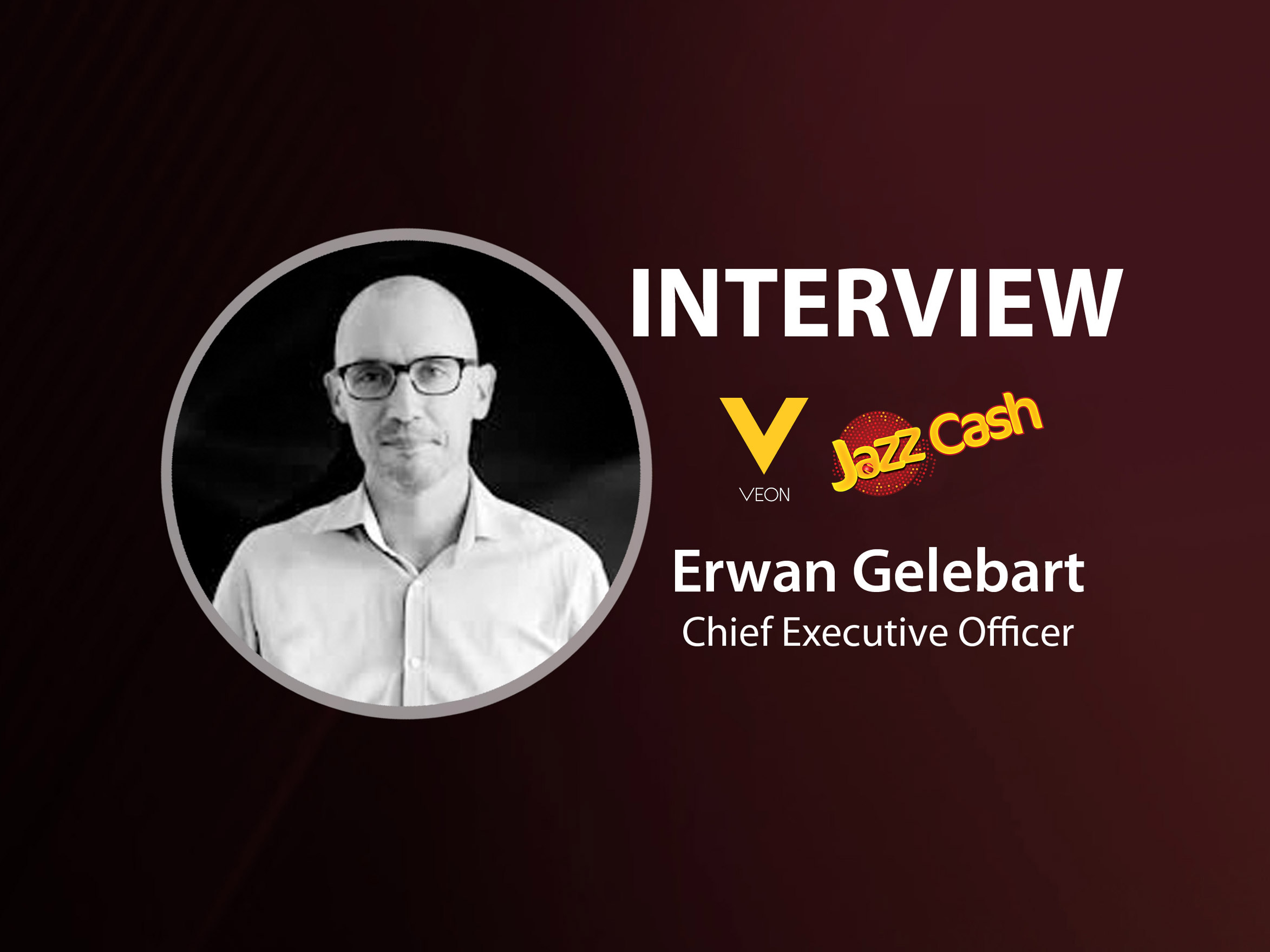In the near-future, people and businesses will have digitized almost every aspect of their payments and other financial needs; given the pace at which fintech is evolving, even the underbanked sections of society will learn to adapt and adopt to this. Erwan Gelebart, CEO at Veon’s JazzCash joins us in this interview to talk about the importance of fintech rising up to meet the challenges of the underbanked.
_____
Can you tell us a little about yourself Erwan?
I have more than 15 years’ experience, including the launch and scale-up of digital financial services in Bangladesh, Ghana, Madagascar and Mali during my time at EY Parthenon, Orange Money and Grameenphone.
I grew up in Africa and spent most of my life there. I feel fortunate I could be exposed to different cultures at such a young age. While a lot of people have difficult living conditions, lots of people there have been kind, open and generous to me. I have always felt that I wanted to give something back. My last project as a consultant was in Ghana in 2008 for the telecom operator MTN where I participated to the launch of their mobile money business. I fortunately feel like the work I’m doing in digital financial services gives me an opportunity to do something positive for people, like giving them better control over their personal finance. That was true when I was working for Orange in Africa and it’s true now for my role at JazzCash.
What are some of the highlights and some of the things you are looking forward to most as the new CEO at JazzCash?
There are a number of things I’m looking forward to at JazzCash, and many I’m already enjoying, but mostly I appreciate that my role gives me the opportunity to make a positive difference to people’s lives in a vibrant country of 220 million inhabitants.
One example of this is our recently announced Mastercard Partnership, which helps provide modern and sophisticated services that would usually only be available to people and businesses with a bank account. In a country where many people cannot directly access financial services and credit cards it will help drive financial inclusion, economic growth and improve lives. I look forward to being able to provide financial services access to a population that has been underbanked for a long time and I see JazzCash’s role as a business that can help remove digital barriers to financial services and significantly improve access for all.
We’d love to hear some of your thoughts on the evolving digital financial services space: how according to you will this segment shape up in time to come, how will emerging tech play a role in this niche and in what ways do you feel newer innovations will be different than current offerings?
Mobile payments have the power to help bridge the digital divide that has opened particularly between developed and developing economies. There are whole regions with untapped potential, where hundreds of millions are demanding better technology and services to enhance their lives. But it’s not always easy to onboard people in developing countries onto digital services, like mobile wallets. More needs to be done to remove the barriers to make sure that the large swathes of unbanked can access services that improve their lives.
I think that emerging technologies within the payments space will continue to play a huge part in driving innovation in economies and ultimately ensuring that countries can drive efficiency and reduce the need for complicated and dull administrative duties. The digitized services enable consumers and merchants to spend increasingly less time having to deal with the hassles of paperwork and will free them up to work on things they’re passionate about and allow them increased transparency and control over their finance.
Our services are also creating tremendous business opportunities for our users in a country where the vast majority creates its own job. They will be increasingly able to efficiently sell their products or services as well as source whatever is needed and access lending solutions. This can make the difference between running a business profitably or not.
In our case, with more than 8 million active digital wallets, JazzCash is already the leading player in Pakistan but has enormous potential – a country with a young, fast-growing population. It has never been more important to address Pakistan’s unbanked population and encourage greater financial inclusion to release the full potential. The people of Pakistan are willing to progress and we are here to help them achieve that.
How according to you has the impact of Covid-19 affected the use and demand for newer contactless solutions, for businesses (retail, e-commerce, etc) and for individual end-users?
Naturally, the importance of digital payments has surged during the past months and this has created changes for all users. Merchants and customers alike now have additional needs to be using these solutions to ensure minimal contact in times of a pandemic. On a positive note this development has forced many digitally complacent businesses to reassess their operations and hopefully future proof their business models for years to come. Ultimately, increasing the abilities for consumers to pay using different means and having to rely less on cash which can be a risky undertaking in some areas.
Read More: GlobalFintechSeries Interview with Michael Higgins, Chief Executive Officer at Velox Clearing
As part of VEON, operating across 10 countries, we believe that Regulators should actively encourage the development of open ecosystems to remove friction and accelerate the adoption of digital payments. At its simplest, for example this could mean, that it’s easier and cheaper to quickly transfer money between friends or family without worrying about belonging to the same bank.
In addition, it is noteworthy that Government subsidies to individuals, businesses and charities are substantial. If these were distributed exclusively through mobile wallets or accounts in developing countries the positive impact this would have on digital prosperity would be significant. Fantastic examples of this for governments already implementing this are Kenya or India, where digital subsidies, paid through M-PESA and PayTM respectively, have contributed to greater financial inclusion and economic growth.
The coronavirus pandemic is fundamentally changing the world we live in. But, by closely working together, I see no reason why we cannot make this change positive for the world’s unbanked population.
When it comes to introducing new payment concepts and digital financial services features to unbanked sections of the world population, what top thoughts and tips would you share?
For lots of people, including you and me, borrowing money, keeping our savings safe and making transactions is relatively easy but for the 100 million people in Pakistan without bank accounts, it’s a struggle. When you are dependent on cash for everything, it makes you very vulnerable. Because there’s no data available about you, no financial institution will lend you the money you need to help you move on in life or support your family. It opens you up to exploitation from loan sharks. It puts you at risk of being underpaid for the work you do because too many intermediaries handling this cash because it reaches you. It also makes life especially difficult for women, who make up the majority of Pakistan’s unbanked and might feel uncomfortable going to one of our point of sales to do a cash in or cash transaction.
Digital financial services like ours at JazzCash can use this growing connectivity to remove many of the financial barriers people face by making it quicker, easier, and safer to make small transactions. More than that, we believe having access to these services is a fundamental right and an important part of a fairer and more equal society. It is vital we address any lack of trust that more vulnerable, cash-dependent people have about digital financial services and help give them reassurance and digital literacy they need to give it a try.
When delivering these services, the realities of the people on the ground need to be carefully considered as these new technologies and services can seem daunting and in order to achieve the highest rate of adoption the benefits and simplicity need to be clearly communicated, without coming across as condescending.
Within the fintech space, what are some of the bigger growth areas (digital financial services, payments solutions, etc) that will be the focus for business growth/innovators/investors for the next few years according to you?
In the future, people will increasingly digitize their payments both at the merchant such as grocery shops and remotely such as booking for a travel. All this is already possible but what will change is that it will become the norm. For example, in Ukraine, our sister operator Kyivstar gives customers the option to pay for taxis using its Smart-Money payments app.
I also suspect that fintech will have a revolutionary impact on insurance by simplifying claims processes and allowing it to finally be available for all. We’re already seeing the entrance of new fintech companies with digital only, mobile wallet driven, health insurances for the masses or else crop insurance for the farmers.
Lending is another very powerful trend. Increasingly, more services have reached tremendous scale across Asia and Africa especially. With the vast majority of the population in need of a loan from time to time, digital access to this can help either short term by helping pay for unexpected bills or longer term to allow people to invest for the future or start businesses.
I am certain that developments in mobile payments will continue to be very interesting to watch this year. With Tencent’s WeChat in China and JazzCash in Pakistan, mobile payments are changing the way people pay for things, locally and globally.
Before we wrap up, would you like to share specific finance management or business tips for Marketing and Sales or Finance teams struggling through this uncertain time?
The current circumstances do not discriminate and are not easy for anyone, at JazzCash we are also impacted and evaluate the situation daily for the sake of our employees and customers. Now more than ever, I am deeply convinced, that when delivering services, you need to apply laser focus to solve your customers’ problems. Novel and critically serious problems arose from this crisis. Beyond pursuing our business strategy our wider mission has grown in importance. So, stick to what you do best, in our case, understand your customers’ problems, work to solve problems and when you don’t succeed double your efforts. Once this crisis will end not only will you have a stronger value proposition, but your customers will also remember that, even in challenging times, their loyalty was rewarded with yours.
Read More: A Quick Review on Some of The Biggest Global Fintech Mergers & Acquisitions

VEON is a NASDAQ and Euronext Amsterdam-listed global provider of connectivity and internet services, headquartered in Amsterdam. The company’s vision is to empower customer ambitions through technology, acting as a digital concierge to guide choices and connect them with resources that match customer needs.
Erwan Gelebart was appointed Chief Executive Officer of Veon’s JazzCash on May 18th 2020.
Erwan joined from Orange Money Madagascar where his latest position was CEO and he led the transformation of what was a traditional mobile money telco-led service to the most diversified digital finance platform in the country, operating as a standalone business under an electronic money issuer license since 2019. He has more than 15 years’ experience, including the launch and scale-up of digital financial services in Bangladesh, Ghana, Madagascar and Mali and while at EY Parthenon, Orange Money and Grameenphone. Erwan holds an MBA from the Asian Institute of Technology as well as a Master’s in Management from SKEMA Business School.
